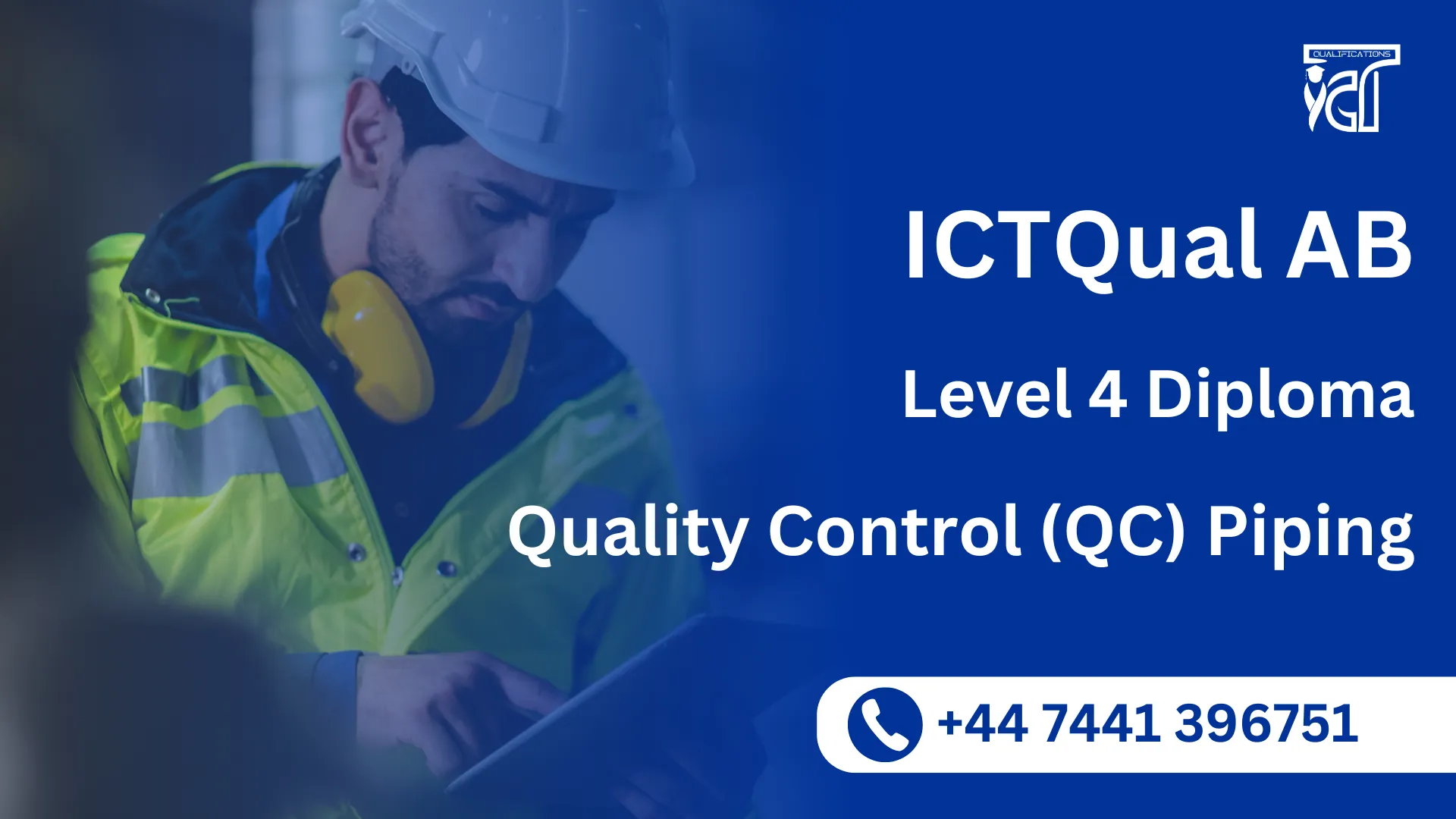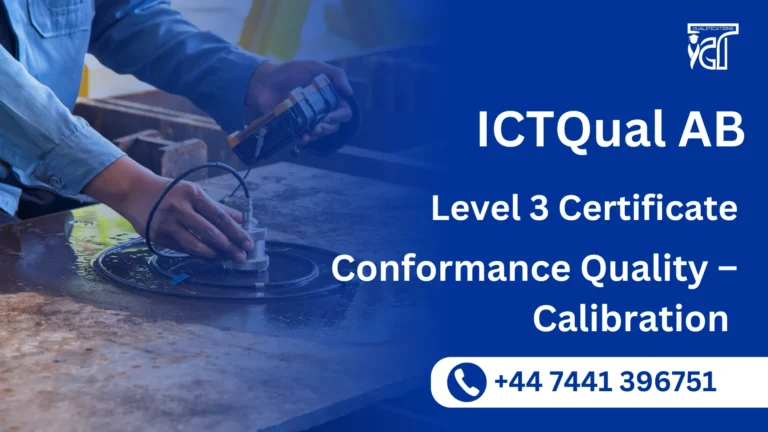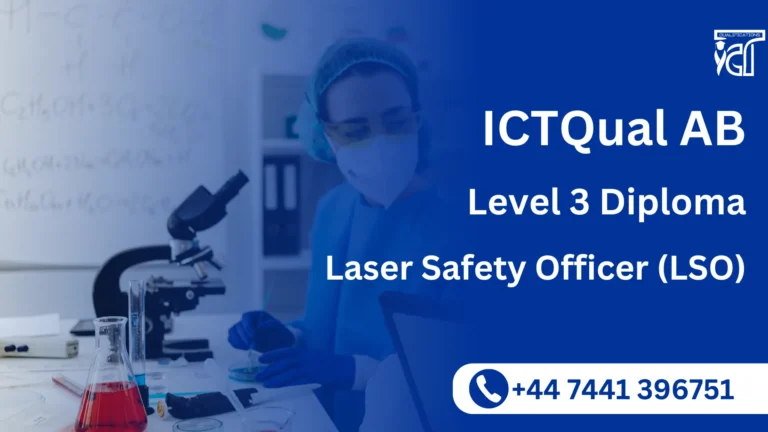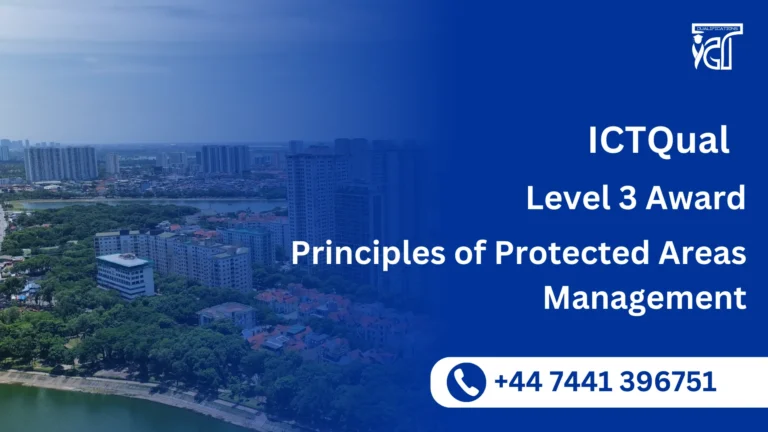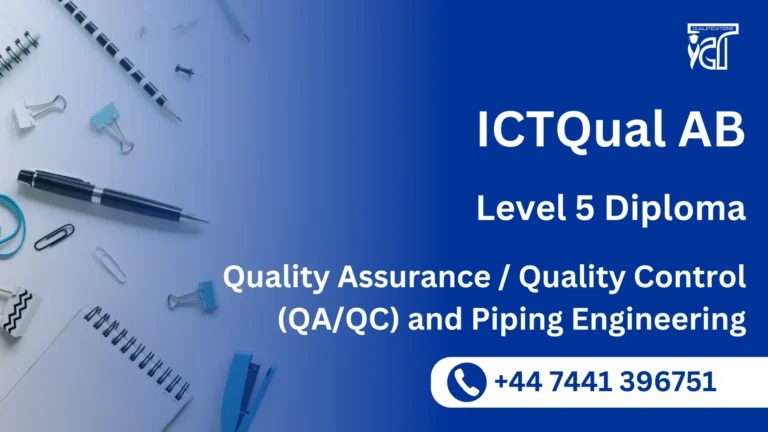The ICTQual AB Level 4 Diploma in Quality Control (QC) Piping is designed as an accessible entry‑level qualification for learners who wish to begin their journey in piping inspection and quality assurance. This program introduces the fundamental principles of piping systems, fabrication processes, and compliance practices, making it an ideal starting point for individuals with little or no prior industry experience.
Learners are guided through the basics of piping materials, welding procedures, and introductory non‑destructive testing (NDT) methods, while also gaining awareness of international standards such as ASME, API, and ISO. The course emphasizes practical understanding, enabling participants to recognize defects, support inspection activities, and contribute to safe and reliable piping operations.
A key focus of the diploma is building confidence and technical awareness. By combining theoretical knowledge with practical exercises and documentation practices, learners develop the skills needed to assist in quality control teams and support industrial projects. The program also highlights the importance of safety, compliance, and ethical responsibility in maintaining industry standards.
Ultimately, the ICTQual AB Level 4 Diploma in Quality Control (QC) Piping provides a strong foundation for future progression. It prepares learners for entry‑level roles in QA/QC and piping inspection while offering a clear pathway to advanced diplomas, specialized certifications, and long‑term career opportunities in industries such as oil, gas, petrochemicals, construction, and manufacturing.
ICTQual AB Level 4 Diploma in Quality Control (QC) Piping
This qualification, the ICTQual AB Level 4 Diploma in Quality Control (QC) Piping, consists of 6 mandatory units.
| Sr# | Unit Title |
| 1 | Inspection Planning and Quality Assurance Strategies |
| 2 | Advanced NDT Methods (RT, UT, MT, PT) |
| 3 | Corrosion Monitoring and Prevention in Piping Systems |
| 4 | Evaluation of Fabrication Drawings and P&IDs |
| 5 | Quality Control Audits and Compliance |
| 6 | Material Traceability and Certification Procedures |
Learning Outcomes for the Study Units:
1. Inspection Planning and Quality Assurance Strategies
By the end of this unit, learners will be able to:
- Develop detailed inspection test plans (ITPs) for complex piping projects.
- Integrate quality assurance (QA) strategies with operational objectives.
- Evaluate inspection checkpoints, hold points, and client-specific requirements.
2. Advanced NDT Methods (RT, UT, MT, PT)
By the end of this unit, learners will be able to:
- Apply advanced Non-Destructive Testing techniques including Radiographic Testing (RT), Ultrasonic Testing (UT), Magnetic Particle Testing (MT), and Penetrant Testing (PT).
- Interpret complex NDT results and assess material condition and structural integrity.
- Ensure compliance with industry codes and safety standards in NDT application.
3. Corrosion Monitoring and Prevention in Piping Systems
By the end of this unit, learners will be able to:
- Identify types and causes of corrosion in piping systems.
- Implement monitoring techniques such as corrosion coupons and probes.
- Recommend and apply corrosion prevention and control methods effectively.
4. Evaluation of Fabrication Drawings and P&IDs
By the end of this unit, learners will be able to:
- Interpret and verify fabrication drawings, piping isometrics, and Piping and Instrumentation Diagrams (P&IDs).
- Check alignment with design specifications and quality standards.
- Identify inconsistencies, errors, or missing data in engineering documentation.
5. Quality Control Audits and Compliance
By the end of this unit, learners will be able to:
- Conduct internal and external quality control audits according to industry protocols.
- Evaluate compliance with ISO, ASME, and other regulatory standards.
- Generate audit findings and implement corrective and preventive actions (CAPA).
6. Material Traceability and Certification Procedures
By the end of this unit, learners will be able to:
- Maintain full traceability of materials from procurement through installation.
- Verify and validate Material Test Certificates (MTCs) and related documentation.
- Implement systems to control documentation, certification, and records management.
The ICTQual AB Level 4 Diploma in Quality Control (QC) Piping is designed as an entry‑level qualification that equips learners with the essential knowledge and skills to begin a career in piping inspection and quality assurance. It provides a strong foundation for those with little or no prior industry experience, making it an accessible pathway into QA/QC and piping systems.
Technical Competence
- Understanding of piping materials and fabrication basics
- Introduction to welding inspection and procedure awareness
- Basic knowledge of non‑destructive testing (NDT) methods for defect detection
- Familiarity with international codes and standards such as ASME, API, and ISO
- Ability to assist in inspection and monitoring activities in industrial projects
- Development of documentation and reporting skills for compliance
Professional Growth
- Entry into QA/QC and piping inspection roles at junior levels
- Recognition through an internationally benchmarked qualification
- Foundation for progression to Level 5 and higher diplomas in QA/QC
- Improved employability in industries such as oil, gas, petrochemicals, and construction
- Opportunity to build a career pathway in piping and quality assurance
Industry Relevance
- Alignment with industry practices in piping and fabrication projects
- Contribution to safety and reliability in industrial operations
- Exposure to case studies and practical scenarios for applied learning
- Ability to support audits, inspections, and compliance reporting
- Knowledge of sustainability and safety standards in piping systems
Personal Development
- Confidence to begin a career in quality control and piping inspection
- Analytical thinking for identifying defects and supporting corrective actions
- Ethical awareness in maintaining safety and compliance standards
- Adaptability to diverse industrial environments and project requirements
- Communication skills for effective reporting and teamwork
- Motivation to pursue higher qualifications and certifications in QA/QC
The ICTQual AB Level 4 Diploma in Quality Control (QC) Piping is designed for learners who are new to the field of piping inspection and quality assurance. The ideal learner is someone motivated to build foundational knowledge of piping systems, fabrication processes, and compliance practices, with a view to progressing toward advanced diplomas and industry roles.
Technical Background
- Learners with a basic understanding of science subjects (physics, materials, or general technical awareness)
- Individuals interested in piping systems, fabrication, and industrial safety practices
- Beginners seeking to learn about international codes and standards such as ASME, API, and ISO
- Candidates eager to explore introductory non‑destructive testing (NDT) methods
- School leavers or early‑career participants starting their journey in QA/QC
Career Aspirations
- Learners aiming to enter QA/QC and piping inspection roles at junior levels
- Individuals seeking recognition through an internationally benchmarked qualification
- Candidates preparing for progression to the ICTQual AB Level 5 Diploma in QC Piping
- Professionals wishing to enhance employability in oil, gas, petrochemical, and construction sectors
- Participants motivated to build a long‑term career pathway in piping and quality assurance
Personal Qualities
- Curiosity and willingness to explore technical subjects
- Attention to detail and accuracy in inspection tasks
- Basic communication skills for reporting and teamwork
- Commitment to safety, compliance, and ethical responsibility
- Adaptability to diverse industrial environments
Completing the ICTQual AB Level 4 Diploma in Quality Control (QC) Piping provides learners with the essential foundation to advance academically and professionally. This qualification opens doors to higher‑level diplomas, specialized certifications, and entry‑level industry roles in piping inspection and QA/QC.
Academic Progression
- Progression to ICTQual AB Level 5 Diploma in Quality Control (QC) Piping
- Eligibility for advanced diplomas in piping engineering, welding inspection, or industrial QA/QC
- Opportunity to pursue specialized certifications such as ASME, API, ISO, and NDT Level II
- Preparation for structured learning routes in project quality management and industrial safety
- Foundation for higher‑level studies in engineering, inspection, and quality assurance disciplines
Career Progression
- Entry into junior QA/QC roles in piping, welding, and fabrication projects
- Opportunities to work as piping assistants or inspection trainees in oil, gas, and petrochemical sectors
- Employability in construction, manufacturing, and power generation industries
- Foundation for supervisory responsibilities after gaining industry experience
- Increased career mobility through an internationally benchmarked qualification
Professional Development
- Recognition as a qualified learner with industry‑relevant skills
- Ability to support audits, inspections, and compliance activities
- Development of technical confidence for real‑world industrial projects
- Access to continuous professional development programs and industry workshops
- Strengthened profile for progression into advanced certifications and diplomas
Entry Requirements
Learners must meet the following criteria to be considered for admission into the course:
- Age Requirement: Minimum age of 18 years or above
- Educational Background: Completion of secondary school education or equivalent. No prior technical qualifications are required, though a basic understanding of science subjects (such as physics or materials) is helpful
- Work Experience: No industry experience is required. The course is suitable for beginners, school leavers, or those starting their journey in piping inspection and QA/QC
- English Language Proficiency: Basic ability in spoken and written English is required, as the program is delivered in English. International learners may be asked to demonstrate proficiency at CEFR A2 level or equivalent
Register Now
Qualification Process
Qualification Process for the ICTQual AB Level 4 Diploma in Quality Control (QC) Piping
- Self-Assessment:
Begin by evaluating your eligibility to ensure you meet the qualification requirements, including work experience, knowledge, and language proficiency. - Registration:
Complete your registration by submitting the required documents, including a scanned copy of a valid ID, and paying the registration fee. - Induction:
An assessor will conduct an induction to confirm your eligibility for the course and explain the evidence requirements. If you do not meet the criteria, your registration will be cancelled, and the fee will be refunded. - Assignments & Evidence Submission:
Provide all assignments and the necessary evidence based on the assessment criteria outlined in the course. If you are unsure of the required evidence, consult with the assessor for guidance on the type and nature of evidence needed. - Feedback and Revision:
The assessor will review your submitted evidence and provide feedback. Evidence that meets the criteria will be marked as “Criteria Met,” while any gaps will be identified. You will be asked to revise and resubmit if needed. - Competence Evidence:
Submit final evidence demonstrating that all learning outcomes have been met. This evidence will be marked as “Criteria Met” by the assessor once it is satisfactory. - Internal Quality Assurance (IQA):
The Internal Quality Assurance Verifier (IQA) will review your evidence to ensure consistency, quality, and compliance with standards. - External Verification:
The IQA will submit your portfolio to ICTQUAL AB External Quality Assurance Verifiers (EQA) for final confirmation. The EQA may contact you directly to verify the authenticity of your evidence. - Certification:
Upon successful completion of all checks, ICTQUAL AB will issue your official certificate, confirming that you have attained the ICTQual AB Level 4 Diploma in Quality Control (QC) Piping

